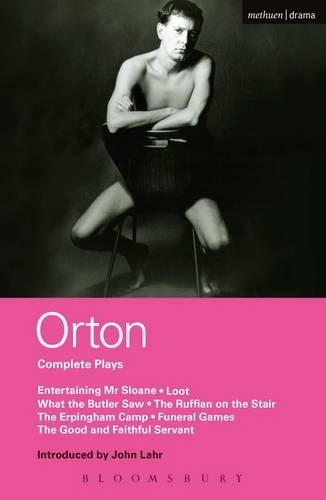
Orton Complete Plays: Entertaining Mr Sloane; Loot; What the Butler; Ruffian; Erpingham Camp; Funeral Games; Good & ...
(Paperback)
Publishing Details
Orton Complete Plays: Entertaining Mr Sloane; Loot; What the Butler; Ruffian; Erpingham Camp; Funeral Games; Good & ...
By (Author) Joe Orton
Bloomsbury Publishing PLC
Methuen Drama
1st August 2006
United Kingdom
Classifications
General
Non Fiction
822.914
Physical Properties
Paperback
448
Width 130mm, Height 196mm, Spine 27mm
418g
Description
I suppose I'm a believer in Original Sin. People are profoundly bad but irresistibly funny' Joe Orton. This volume contains everything that Orton wrote for the theatre, radio and television from his first play in 1964, The Ruffian on the Stair, up to his violent death in 1967 at the age of 34. It includes his major successes: Entertaining Mr Sloane, which 'made more blood boil that any other British play in the last ten years' (The Times); Loot, 'a Freudian nightmare', which sports with superstitions about death - as well as life; his farce masterpiece, What the Butler Saw; The Erpingham Camp, his version of The Bacchae, set in a Butlin's holiday resort; together with his television plays, Funeral Games and The Good and Faithful Servant. The volume includes a revealing introduction by John Lahr, Orton's official biographer.
"He is the Oscar Wilde of Welfare State gentility" (Observer)
Author Bio
Joe Orton (1933-1967) was an English playwright noted for his black comedies, which combine genteel dialogue with violent and shocking action. Orton left home at 16 to train as an actor. His subversive style of humour first revealed itself in a bizarre incident in 1962, when he and his lover, Kenneth Halliwell were jailed for defacing library books. The two had carefully removed jacket blurbs from middle-brow novels and substituted their own, mostly scatological, counterfeits. Orton delighted in shocking audiences by breaking taboos surrounding sexuality and death in conventionally structured 'black' farces involving epigrammatic dialogue and frenetic, convoluted plots. Thus, in Entertaining Mr Sloane (1964), a young lodger attempts to lure a woman and her brother into providing him with all he needs, only to find he has become each one's sexual plaything; Loot (1965) is a parody of a detective story involving much comic business with a coffin and a corpse; and What the Butler Saw (1969) stylishly turns farce on its head. Orton was a homosexual in a period before the liberalization of British law, and this side of his life is described in detail in his posthumously published diaries. He was battered to death by Halliwell (who subsequently committed suicide) during a domestic argument at their home in Islington, North London.
